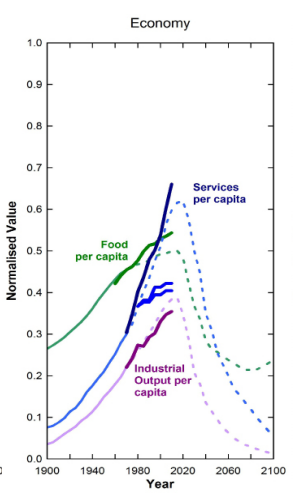The Limits to Growth predicted the demise of economic growth back in 1972. Though the book received much criticism since then, Graham Turner recently confirmed that current development follows the patterns predicted by the book.
But there's one problem, which is well-known to economists in growth economics. The resource ceiling ignores technology as the capacity to switch between limited resources. The confirmatory evidences Turner found belong to the upcoming trend. Indeed, the world economy consumes more oil and food. It's okay. Bad things are supposed to happen when the economy per capita will be unable to consume more goods and services.
And the model hasn't yet confirmed these bad expectations. It's unlikely to. When some resource becomes scarcer, its price increases, and humans demand more efficient technologies, like energy-saving appliances and fuel-efficient cars. The world had an oil price shock already in the 1970s. It made better air conditioning and small cars popular even in the US.
The limit of growth comes not from too little oil, but from too much oil. Everyone invests in oil technologies for more than a century because no one sees a cheaper and more abundant resource. These investments made fossil fuels very efficient and attractive. Alternative energy can hardly compete with them.
Fossil fuels impose indirect costs, affect the environment, and crowd out investments into alternative energy. They are difficult to deal with. And their prices go down, thanks to fracking and other extraction methods.
Technologies may save the world from running out of oil, but they're themselves powerful enough to slow down development. Nuclear weapon is making troubles around for more than 60 years. Hitler nearly obtained the atomic bomb. And Germany would get it not by surprise, like a terrorist organization, but because it was one of the most developed societies in the world before the 30s. Technologies aren't safe in the hands of most advanced and democratic countries.
So, the limits to growth are trickier than the finiteness of certain resources. And these limits are less predictable.

No comments:
Post a Comment